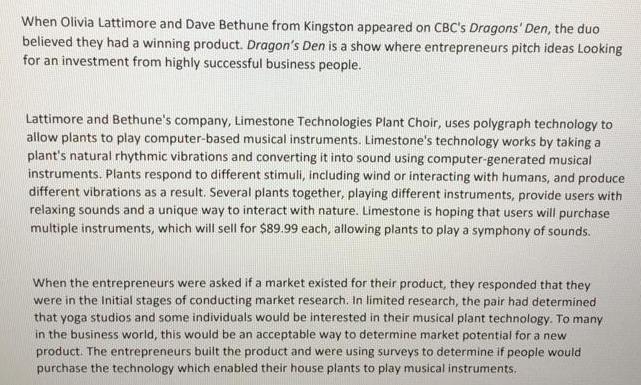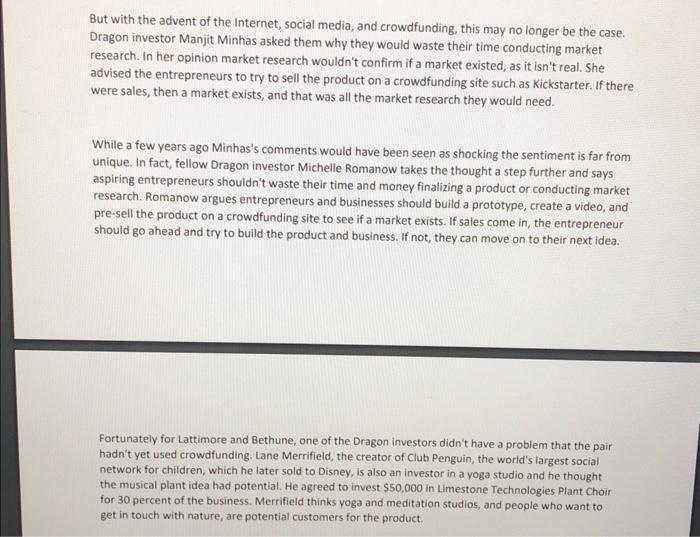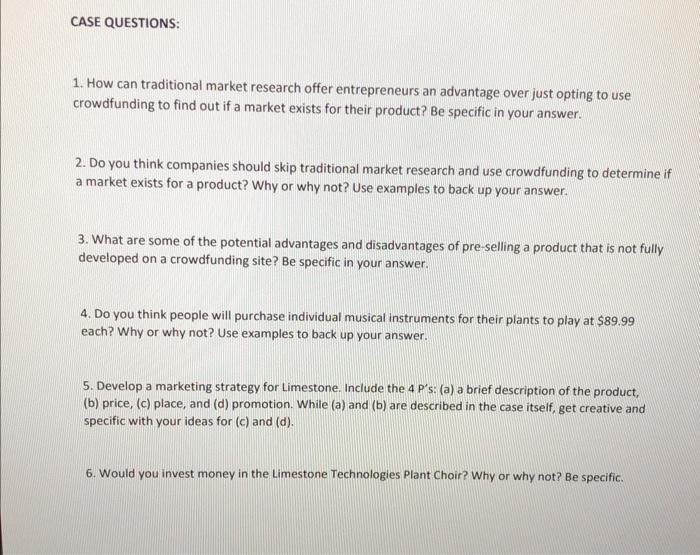Answered step by step
Verified Expert Solution
Question
1 Approved Answer
When Olivia Lattimore and Dave Bethune from Kingston appeared on CBC's Dragons' Den, the duo believed they had a winning product. Dragon's Den is



When Olivia Lattimore and Dave Bethune from Kingston appeared on CBC's Dragons' Den, the duo believed they had a winning product. Dragon's Den is a show where entrepreneurs pitch ideas Looking for an investment from highly successful business people. Lattimore and Bethune's company, Limestone Technologies Plant Choir, uses polygraph technology to allow plants to play computer-based musical instruments. Limestone's technology works by taking a plant's natural rhythmic vibrations and converting it into sound using computer-generated musical instruments. Plants respond to different stimuli, including wind or interacting with humans, and produce different vibrations as a result. Several plants together, playing different instruments, provide users with relaxing sounds and a unique way to interact with nature. Limestone is hoping that users will purchase multiple instruments, which will sell for $89.99 each, allowing plants to play a symphony of sounds. When the entrepreneurs were asked if a market existed for their product, they responded that they were in the Initial stages of conducting market research. In limited research, the pair had determined that yoga studios and some individuals would be interested in their musical plant technology. To many in the business world, this would be an acceptable way to determine market potential for a new product. The entrepreneurs built the product and were using surveys to determine if people would purchase the technology which enabled their house plants to play musical instruments. But with the advent of the Internet, social media, and crowdfunding, this may no longer be the case. Dragon investor Manjit Minhas asked them why they would waste their time conducting market research. In her opinion market research wouldn't confirm if a market existed, as it isn't real. She advised the entrepreneurs to try to sell the product on a crowdfunding site such as Kickstarter. If there were sales, then a market exists, and that was all the market research they would need. While a few years ago Minhas's comments would have been seen as shocking the sentiment is far from unique. In fact, fellow Dragon investor Michelle Romanow takes the thought a step further and says aspiring entrepreneurs shouldn't waste their time and money finalizing a product or conducting market research. Romanow argues entrepreneurs and businesses should build a prototype, create a video, and pre-sell the product on a crowdfunding site to see if a market exists. If sales come in, the entrepreneur should go ahead and try to build the product and business. If not, they can move on to their next idea. Fortunately for Lattimore and Bethune, one of the Dragon investors didn't have a problem that the pair hadn't yet used crowdfunding. Lane Merrifield, the creator of Club Penguin, the world's largest social network for children, which he later sold to Disney, is also an investor in a yoga studio and he thought the musical plant idea had potential. He agreed to invest $50,000 in Limestone Technologies Plant Choir for 30 percent of the business. Merrifield thinks yoga and meditation studios, and people who want to get in touch with nature, are potential customers for the product. CASE QUESTIONS: 1. How can traditional market research offer entrepreneurs an advantage over just opting to use crowdfunding to find out if a market exists for their product? Be specific in your answer. 2. Do you think companies should skip traditional market research and use crowdfunding to determine if a market exists for a product? Why or why not? Use examples to back up your answer. 3. What are some of the potential advantages and disadvantages of pre-selling a product that is not fully developed on a crowdfunding site? Be specific in your answer. 4. Do you think people will purchase individual musical instruments for their plants to play at $89.99 each? Why or why not? Use examples to back up your answer. 5. Develop a marketing strategy for Limestone. Include the 4 P's: (a) a brief description of the product, (b) price, (c) place, and (d) promotion. While (a) and (b) are described in the case itself, get creative and specific with your ideas for (c) and (d). 6. Would you invest money in the Limestone Technologies Plant Choir? Why or why not? Be specific.
Step by Step Solution
There are 3 Steps involved in it
Step: 1
1 How can traditional market research offer entrepreneurs an advantage over just opting to use crowdfunding to find out if a market exists for their product Be specific in your answer Traditional mark...
Get Instant Access to Expert-Tailored Solutions
See step-by-step solutions with expert insights and AI powered tools for academic success
Step: 2

Step: 3

Ace Your Homework with AI
Get the answers you need in no time with our AI-driven, step-by-step assistance
Get Started


